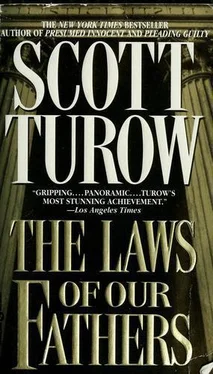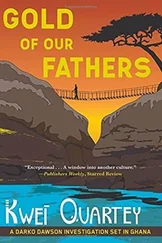Scott Turow - The Laws of our Fathers
Здесь есть возможность читать онлайн «Scott Turow - The Laws of our Fathers» весь текст электронной книги совершенно бесплатно (целиком полную версию без сокращений). В некоторых случаях можно слушать аудио, скачать через торрент в формате fb2 и присутствует краткое содержание. Жанр: Криминальный детектив, на английском языке. Описание произведения, (предисловие) а так же отзывы посетителей доступны на портале библиотеки ЛибКат.
- Название:The Laws of our Fathers
- Автор:
- Жанр:
- Год:неизвестен
- ISBN:нет данных
- Рейтинг книги:5 / 5. Голосов: 1
-
Избранное:Добавить в избранное
- Отзывы:
-
Ваша оценка:
- 100
- 1
- 2
- 3
- 4
- 5
The Laws of our Fathers: краткое содержание, описание и аннотация
Предлагаем к чтению аннотацию, описание, краткое содержание или предисловие (зависит от того, что написал сам автор книги «The Laws of our Fathers»). Если вы не нашли необходимую информацию о книге — напишите в комментариях, мы постараемся отыскать её.
The Laws of our Fathers — читать онлайн бесплатно полную книгу (весь текст) целиком
Ниже представлен текст книги, разбитый по страницам. Система сохранения места последней прочитанной страницы, позволяет с удобством читать онлайн бесплатно книгу «The Laws of our Fathers», без необходимости каждый раз заново искать на чём Вы остановились. Поставьте закладку, и сможете в любой момент перейти на страницу, на которой закончили чтение.
Интервал:
Закладка:
This would allow the army to stop trying to rout the NLF from their networks of tunnels, dangerous, often lethal duty, loathed by our servicemen. Instead, grunts could just point a portable device and cook the gooks alive. These ghoulish rumors were never denied, and as a result the facility was the target of repeated demonstrations. Marchers stormed up the road and were regularly rebuffed by phalanxes of university security police in helmets and shields.
'Hey, man,' said Hobie one night during Doobie Hour, 'this stuff about roasting slopes in the tunnels – is that for real?'
'That's classified,' Michael said immediately, a response which deadened the room. He finally tipped a shoulder. 'I'm doing a little work in there. Just a little. In one of the labs. Everything is need-to-know. But there's a lot of unusual microwave research. You hear stuff.'
'Evil,' Hobie muttered. 'What about you, dude?' Hobie asked. 'Is your shit classified?'
'That's classified,' answered Michael, in what passed from him as outrageous humor.
As guardian of the counterculture, Hobie was always suspicious of straights and he was sure now he was on to Michael. 'You think Eddgar knows he's got a fascist scientist around his boy?' Hobie asked as soon as Michael left. 'Did you hear him? "That's classified." What could he be doing that's classified? You think he's studying the peace process? I'll bet Eddgar isn't hip to it.' Hobie hooted. He ridiculed political involvements and Eddgar therefore presented an especially tempting target. Hobie's father, Gurney Turtle, was on the executive board of the Kindle County NAACP, and throughout high school and the early years of college, I was arm-in-arm with him and Hobie's mother, Loretta, at marches and demonstrations for open housing, for passage of the Civil Rights Act, during those sweet, inspired days when we believed the right laws would bring down every barrier. Hobie made fun of us all. His concern was the inner realm. He read The Tibetan Book of the Dead and Nightwood and the novels of
Hermann Hesse. He listened to Charles Mingus records, and took incredible quantities and varieties of dope. Hobie's credo was that thought was culture and culture was the vice that contained us all. Anything conventional, any activity people had tried before, whether it was sit-ins or even revolution, was hopeless, a dreary repetition of the limitations of the past. 'Michael's a good head,' I answered.
Lucy, who disliked no one, spoke up for him too. He was an Aquarius, she said. It was a compliment, though I didn't know why. She'd found a job at a kiosk on Fisherman's Wharf, drawing astrological charts, an activity she viewed with Delphic seriousness and which Hobie, to her face, treated as laughable.
'He's just quiet,' said Sonny.
'Quiet?' asked Hobie. 'Sometimes when I'm with him, man, I feel like I'm in a Bergman movie.'
Much as I wanted to defend Michael, there was no denying the cryptic element. He was a ham operator and had three or four radios, big clunky boxes, in his apartment. This activity was what had first led him to speculate about wave motion and energy, the unseen realm of the furthest spectrum of light. When he was ten, Michael's mother had died. He never spoke about that, but I often imagined him as a boy in his small Idaho town, lonely, half-orphaned, sitting up at night, spinning the dials and listening to the jits and jots of Morse code, the static-scratched voices in other languages. Typically, he was only a listener; he sent no messages of his own. He said he had tried it once or twice, but he was never quick enough with the snappy lingo of the airwaves. On occasion when I was searching for Nile, I'd knock on Michael' s door and, getting no response, let myself in, only to find Michael sitting there with his headset, mystically absorbed by these unseen lives and the flickers of sound they emitted from almost as far off as heaven.
On our side of the Bay, Friday, November 14, 1969 was warm and clear. The National Student Mobilization Committee had scheduled local demonstrations across the country, hoping to spark interest in the massive marches set to take place the next day in San Francisco and Washington, DC. My own interest in stopping the war was growing increasingly personal and desperate. Throughout the fall, I'd endured a series of dismal phone calls from home in which my mother in her heavy accent read the latest bad news from my draft board. First my application for conscientious-objector status was denied; then I was ordered to report for a pre-induction physical. In response, I talked about leaving the country, and my mother, two thousand miles away, wept. Grabbing the phone, my father would order me to cease discussing such insane plans. The two of us always ended up screaming.
It's probably useless trying to explain the passions of one era to another. I can say now, as a sign of mature detachment and openness to reason, that my views about Vietnam might even have been wrong. But I do not mean it. They were formed then with the hardness of diamonds and not even the surface can really be scratched. I carried few images of Vietnam with me. 1 did not see its overgrown humid beauty, its mountain verdure, or the casual depravity of drugged-out troops fragging lieutenants or having debased encounters with former peasant girls, now sexual zombies in the meaty trading places of the cities. For me it was the vaguer, close-up view of the nightly news: sweating grunts streaked by camouflage paint, tensely stalking among the oversized leaves of the tropical Asian forests; huts in flames and black-garbed peasant mothers running with their bald-headed babies as strafing raised dust along the earth. The wrong of Vietnam was not on the ground but in the air – in principle, far more than in particulars. I envisioned a black heart, a jungle enshrouded in permanent night, where conscience and reason did not even make the skittering light of tracers in the air. I did not deceive myself: the rage of that era was not simply about whose prediction of the future of Southeast Asia was accurate, or the issue of an indigenous people's right to control their nation, or even the debate about whether Ho Chi Minh was more noble than the U S-sponsored thugs. In my own mind, in my own bones, the war protest represented an entire generation in combat against the rigid views of our parents, especially about the roles of men -about the need for males to be warriors, patriots, conformists, unblinking followers of aging generals and other elders. The furious issue was what would happen to all of us, parents and children, if the laws of our fathers were forgotten.
On November 14, about five thousand people surged up the dry road from campus, boiling dust on our way to the Applied Research Center. We larked in the warm air, flaunting banners and chanting slogans. 'One. Two. Three. Four. We don't want this fucking war.' 'Withdraw, Nixon, like your father should have.' 'Drop acid, not bombs.' Although she was burdened by her classes, Sonny was with me. Women's liberation notwithstanding, the war had a special gender inequality, since only men were being drafted. The watchword of the day was 'Girls say yes to boys who say no.' I always felt the moment I'd won Sonny the prior spring was when I'd confided that I was serious about going to Canada, a step she'd pledged to support.
A lawsuit had forced the university to permit us onto the grounds of the ARC, and its iron gates, tipped in spears of gold, were thrown open. A cast of thousands, we marched on the winding asphalt road past the precise lawns and hedges, up to a wide concrete plaza that fronted the Research Center. The building, ordinarily unseen except from a distance, loomed there like Oz. It was a futurist design with large fluted pillars of sand-colored stucco and vast windows protected from the sun by a cantilevered overhang. Between the building and the crowd, the Damon Security Corps positioned themselves in three even rows. In the middle ground, a single square fountain issued a segmented spray that piddled on brainlessly, wavering in an occasional light wind. The cops wore white reflective patrol belts angled across their chests, the better to recognize each other in a melee, and riot helmets whose Plexiglas visors were raised like the lids on welders' masks.
Читать дальшеИнтервал:
Закладка:
Похожие книги на «The Laws of our Fathers»
Представляем Вашему вниманию похожие книги на «The Laws of our Fathers» списком для выбора. Мы отобрали схожую по названию и смыслу литературу в надежде предоставить читателям больше вариантов отыскать новые, интересные, ещё непрочитанные произведения.
Обсуждение, отзывы о книге «The Laws of our Fathers» и просто собственные мнения читателей. Оставьте ваши комментарии, напишите, что Вы думаете о произведении, его смысле или главных героях. Укажите что конкретно понравилось, а что нет, и почему Вы так считаете.












